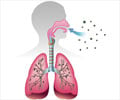Deadly human fungal infections caused by certain strains of Aspergillus fungi appear to be developing resistance to current drug treatments at an alarming rate, say scientists.

Using the new test, which uses direct molecular detection rather than culturing the fungus in a Petri dish, the team found that 55% of aspergillosis patients had telltale signs known as 'markers' that indicated they had developed resistance to azoles. The findings compare to resistance rates of 28% carried out by the team just two years ago using traditional culturing methods.
Furthermore, the study – published in the prestigious US journal Clinical Infectious Diseases – discovered azole-resistance markers in three-quarters of the small number of aspergillosis patients (eight) whom had never been treated with an azole, suggesting widespread dissemination of resistance.
"Aspergillus significantly worsens asthma symptoms and causes life-threatening infections in those with long-term lung infections or damaged immune systems, such as chemotherapy and transplant patients or people with HIV," said David Denning, Professor of Medicine and Medical Mycology at The University of Manchester and Director of the National Aspergillosis Centre at the University Hospital of South Manchester NHS Foundation Trust.
"Using an ultrasensitive, real-time test for Aspergillus, similar to the method used to diagnose HIV, MRSA and influenza, we have directly detected azole resistance in people with aspergillosis, without first culturing the fungus in a dish. The presence of Aspergillus was detected in many more samples than using traditional culture methods, and 55% were found to contain azole-resistance markers.
"This is an extraordinarily high rate of resistance, possibly related to fungicide use in agriculture – more than a third of 'pesticides' used by UK farmers are azoles – and long treatment courses in patients, so the findings have major implications for the sustainability of azoles for human antifungal therapy."
Advertisement
In this latest study, the researchers analyzed phlegm from patients with allergic and chronic lung disease caused by Aspergillus and found that almost twice the proportion of individuals tested had resistance markers in their sample compared to a Petri dish (or culture) study carried out by the team in 2008/9.
Advertisement
Source-Eurekalert










